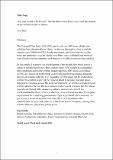Files in this item
"Are you proud to be British?" : Mobile film shows, local voices and the demise of the British Empire in Africa
Item metadata
| dc.contributor.author | Rice, Tom | |
| dc.date.accessioned | 2016-12-04T00:32:51Z | |
| dc.date.available | 2016-12-04T00:32:51Z | |
| dc.date.issued | 2016 | |
| dc.identifier | 195584096 | |
| dc.identifier | de8d866f-22cd-45e9-a717-8877ecb5426c | |
| dc.identifier | 84930336896 | |
| dc.identifier | 000382335900003 | |
| dc.identifier.citation | Rice , T 2016 , ' "Are you proud to be British?" : Mobile film shows, local voices and the demise of the British Empire in Africa ' , Historical Journal of Film, Radio and Television , vol. 36 , no. 3 , pp. 331-351 . https://doi.org/10.1080/01439685.2015.1049863 | en |
| dc.identifier.issn | 0143-9685 | |
| dc.identifier.other | BibCode: NIS195584096 | |
| dc.identifier.other | ORCID: /0000-0002-4333-7493/work/77524756 | |
| dc.identifier.uri | https://hdl.handle.net/10023/9927 | |
| dc.description.abstract | The Colonial Film Unit (CFU) (1939–1955) produced over 200 films, which were exhibited non-theatrically to African audiences through its fleet of mobile cinema vans. While the CFU closely monitored, and theorised on, its film texts, the particular ways in which these films were exhibited and received was afforded far less attention and remains critically overlooked by scholars. In this article, I examine the development of the mobile film show across a range of colonial territories. The London-based CFU sought to standardise film exhibition across the empire, imagining these film shows as political events, as a means of monitoring, addressing and homogenising disparate groups of colonial subjects. The regulation of film space can be understood within this context as part of the broader effort to regulate colonial space. Integral to this process was the local commentator, an often-overlooked figure within African cinema. The local commentator would organise the film show, provide additional talks, answer questions, counter unrest and recontextualise the films for local audiences, often without any direct European supervision. In examining government reports, personal interviews and, in particular, a series of audience surveys, the article repositions the commentator as a pivotal presence in the latter years of empire; a rising voice within African cultural and political life. | |
| dc.format.extent | 550914 | |
| dc.language.iso | eng | |
| dc.relation.ispartof | Historical Journal of Film, Radio and Television | en |
| dc.subject | British Empire | en |
| dc.subject | Sub-Saharan African cinema | en |
| dc.subject | Colonial cinema | en |
| dc.subject | Mobile film shows | en |
| dc.subject | Audiences | en |
| dc.subject | Exhibition | en |
| dc.subject | Film commentator | en |
| dc.subject | Colonial film unit | en |
| dc.subject | PN1993 Motion Pictures | en |
| dc.subject | BDC | en |
| dc.subject | R2C | en |
| dc.subject.lcc | PN1993 | en |
| dc.title | "Are you proud to be British?" : Mobile film shows, local voices and the demise of the British Empire in Africa | en |
| dc.type | Journal article | en |
| dc.contributor.institution | University of St Andrews. Film Studies | en |
| dc.contributor.institution | University of St Andrews. School of Philosophical, Anthropological and Film Studies | en |
| dc.identifier.doi | 10.1080/01439685.2015.1049863 | |
| dc.description.status | Peer reviewed | en |
| dc.date.embargoedUntil | 2016-12-03 |
This item appears in the following Collection(s)
Items in the St Andrews Research Repository are protected by copyright, with all rights reserved, unless otherwise indicated.

